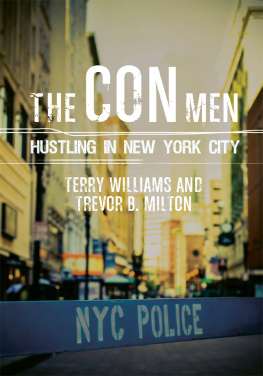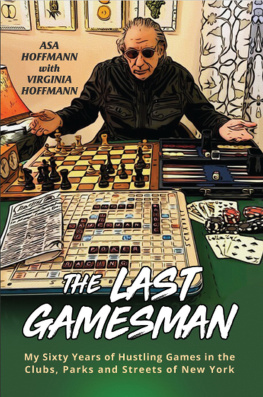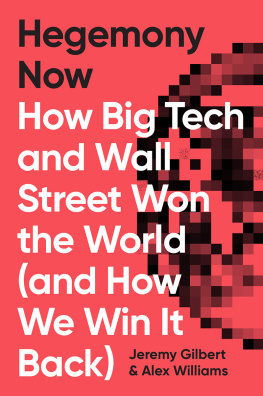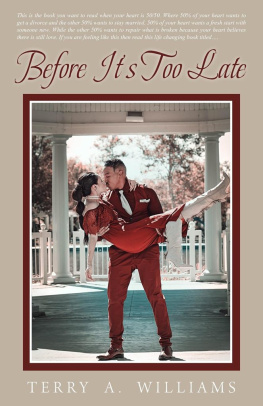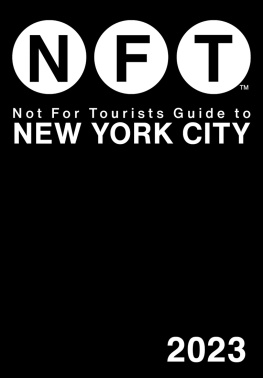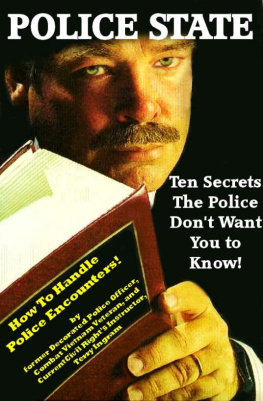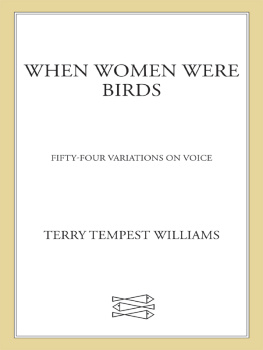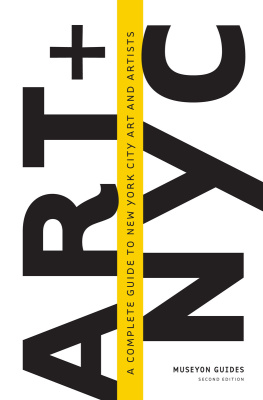THE CON MEN
STUDIES IN TRANSGRESSION
STUDIES IN TRANSGRESSION
SERIES EDITOR: DAVID BROTHERTON
FOUNDING EDITOR: JOCK YOUNG
The Studies in Transgression series presents a range of exciting new crime-related titles that offer an alternative to the mainstream, mostly positivistic approaches to social problems in the United States and beyond. Books in the series raise awareness of key crime-related issues and explore challenging research topics in an interdisciplinary way. They allow the global voiceless to have their views heard, offering analyses of human subjects who have too often been marginalized and pathologized.
THE CON MEN
HUSTLING IN NEW YORK CITY
TERRY WILLIAMS AND
TREVOR B. MILTON
COLUMBIA UNIVERSITY PRESS NEW YORK
Columbia University Press
Publishers Since 1893
New York Chichester, West Sussex
cup.columbia.edu
Copyright 2015 Columbia University Press
All rights reserved
E-ISBN 978-0-231-54049-0
Library of Congress Cataloging-in-Publication Data
Williams, Terry M. (Terry Moses), 1948
The con men : hustling in New York City / Terry Williams and
Trevor B. Milton.
pages cm. (Studies in Transgression)
Includes bibliographical references and index.
ISBN 978-0-231-17082-6 (cloth : alk. paper)
ISBN 978-0-231-54049-0 (e-book)
1. CrimeNew York (State)New York. 2. CriminalsNew York (State)New York. 3. PoliceNew York (State)New York. I. Milton, Trevor, 1976 II. Title.
HV6795.N5W55 2015
364.16' 3097471dc23
2015009581
A Columbia University Press E-book.
CUP would be pleased to hear about your reading experience with this e-book at .
Cover design: Marc Cohen
Cover image: Mr Doomits/Shutterstock
References to websites (URLs) were accurate at the time of writing. Neither the author nor Columbia University Press is responsible for URLs that may have expired or changed since the manuscript was prepared.
CONTENTS
T here are many people to thank in any book, and it is too much to hope that no one is left out. Two people were central in my early graduate work: Professor William Kornblum and Lindsey Churchill. Churchill became interested in the con-game dialogue and encouraged me to write about the con-game language in his class on ethnomethodology, and this course paid attention to the discursive elements in everyday worlds I was exploring. Kornblums insights into city ecology opened my eyes to a world of sociological possibilities using a Chicago School lens.
Special thanks to the following people who helped with this book in one way or another: Mario Serrano Marte, whose fieldwork and writing in my ethnography class were central to our text on Maria the numbers operator and who generously gave his permission to use the material. I greatly acknowledge the wisdom and intelligence afforded us by Elmo Johnson, who provided much of the information about street hustling and other games of chance in the text; Dr. Sarah Daynes, my indefatigable colleague, whose intelligence and steadfast assistance is inestimable; Hakim Hasan, my dear friend and intellectual mentor whose suggestions, criticisms, and assistance regarding the draft was extremely important and timely. I wish to express my especial thanks to Jules Lipow, who, along with Natalia Filippova, provided expert knowledge and sagely wisdom of the market; and to my New School University graduate assistants, Ganji Rezvaneh and Guillermina Altomonte, whose hard work and diligence in the library were admirable; Zacch Yemi Olorunnipa, a Princeton student whose fine ethnographic work was extremely helpful; one of my graduate students, Bryan B., whose work on panhandling was instructive; Dr. Lucille Perez, for a conversation that was extremely helpful in understanding the life of teens in the con-game scene; my sisters, Sandra Smith, Janice Williams, Cynthia Pippins, and Jennifer MacDougal, for their lifelong intellectual and loving assistance in all matters of life, love, and food; my cousins, Wallace Dillon, Edward Dillon, Rodney (Stick) Williams, Jenene Bush, Audrey Brown, Linda Hannah, Caron Williams, Donnie Williams, Mack Bethea, Jerry Williams, Denise Williams, Sharon Williams, Penelope Cade, Sally Cade, Vernon Cade Jr., Edwin Moses, Barbara Ann Dillion, and Jean Williams; and my aunt Velma Anderson. Thanks also to New School University Dean Will Milberg, President David Van Zandt, Provost Tim Marshall, David West, Sonia Salas, and Jessie Sze; and thanks to Maria F. Heyaca for her special assistance when needed the most. Special thanks to Charles Winick, Robert Merton, and to Jason Maxwell and his co-barber in the appointment shop, Trevor Bethel, for their wisdom and exciting word display. The Boogie Woogie boysJessie Day and Yates Austin, Daron Howard, Paul Craig, Leo Craig, Cookie, Robert Simels, Martin Stolar, Sam Frazier, Jay, and Madelinefor their continued support during the writing of the manuscript. And special thanks to Elsie Chandler, Royce Wilder, Rick Jones, and other courageous staff at the Neighborhood Defenders Service of Harlem office. Their magnificent work on behalf of the people in the city, especially minority kids in trouble, is greatly appreciated. The Defenders staff took their precious time to discuss with me their experiences with young people in Harlem. I have changed or altered some names and locations to respect a desire for anonymity on the part of certain people in the narrative. Thanks also to the editors at Columbia University Press: Jennifer Perillo, Stephen Wesley, Eric Schwartz, and Robert Fellman.
And lastly kudos are due to Alibi, Herlene, Mrs. Wilson, Ace, Skip, and Quick, though reluctant and recalcitrant at times, but without whom this book could not have been written. In the final analysis, if there are errors and issues of interpretation, they are the sole responsibility of the authors.
Terry Williams

I would like to thank Aubrey Bonnett for being a friend and a wise and trusted colleague and for pointing me in the direction of the Public Criminology Series at John Jay College for Criminal Justice; David Brotherton for suggesting our text to the editors at Columbia University Press; Jock Young, who selected our text for the Public Criminology Series shortly before his passing and whose scholarship is invaluable to the field; Joseph Culkin, Joann Rollo, and all the faculty at Queensborough Community College, for providing a warm, family-friendly, and truly collegial environment in which to work; my officemate, Don Tricarico, who fielded numerous random/unrelated questions; my students at Queensborough and SUNY Old Westbury, who provided invaluable feedback on the text; Jonathan Schiffer, who led me to important contacts; Martin Caba, for linking me up with Ramon; my beautiful wife, Natalia, for her love, hard work, emotional support, and tolerating my sporadic jaunts into the city for ethnographic observation; my children, Zhyom and Zhyara, for making me smile and laugh when I got home; Jan Holland, for being a friend and trusted colleague that I could always come to for advice; all of my respondents, J.T., Otis, Lee, Daniel, Angelina, Frank, Ramonthank you for making this such a colorful text; the editors at Columbia University Press, Jennifer Perillo, Stephen Wesley, and Eric Schwartz, for being true professionals and excellent wordsmiths; a special thanks to Terry Williams, for being a teacher, mentor, master ethnographer, critic, colleague, compatriot, and friend; and also M. Grabosky and other reviewers for their insightful assistance in making the manuscript the best it could be. But after all is said and done, if there are errors and issues of interpretation, they are indisputably our own.

